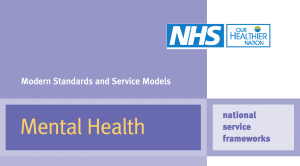
Carers, those family and friends who are actively and routinely involved in supporting and caring for someone with health and social care needs, are involved in fundamentally human and humane activities. They do it because they have strong bonds with the person they care for.
This and their contribution to an individual’s care, to health and social care services, and to society have been well documented, quantified, costed and recognised several times over in national policies. We know a lot about the positive aspects of caring and its burdens. We know all this and have known it for a long time.
In mental health, for example, the National Service Framework (NSF), published in 1999, was a 10-year blueprint for improving services across England and it only had 7 overarching Standards; one of which was focused on improving things for carers. The challenges and the rewards of the situations facing carers of people with mental health situations was clearly established then, and the NSF sought to guide services to improve their work with carers.
With all this knowledge and now long-term focus on helping carers in mental health services, how much progress has been made? To help answer this, I will consider this paper by Cree et al. from 2015.

The 1999 National Service Framework set out the blueprint for working with carers of people with mental illness.
Methods
The authors set out to explore carers’ experiences of the care planning process for people with severe mental illness, their involvement in this, and how, if necessary, it could be improved. Care planning has long been considered a cornerstone of good care in mental health, especially for those with more severe mental health problems. Cree and colleagues explored these issues through focus groups and interviews with carers. Themes identified in the focus groups were later explored in more detail in interviews with carers (N=26).
The sample of participants was recruited from the pool of carers in 2 mental health trusts in England, using a range of methods including advertising in newsletters, posters and Twitter. They sought to recruit a diversity of people.
The authors provide further details of their methods and how they analysed the data from the focus groups and interviews. This analysis included service users and carers working alongside experienced qualitative researchers.
Results
The carers had well-defined ideas of what a good care planning process and plan should be like, what it should be for and what it ought to include. They felt that a good care plan would have shared aims arrived at with input from all pertinent parties. The plan should also be clearly communicated, e.g. written down,concisely, shared, with expectations of timescales and progress, containing clarity on what services would be provided, and plans for dealing with set backs, and be flexible and adaptive to change. The carers saw a plan as important in aiding a person’s recovery and assisting in good communication between everyone.
The in-depth and long-term knowledge that carers can provide was seen as an important foundation to care plans. Their ability to identify early warning signs of relapse was seen as a key resource. The carers saw their potential contribution as greater during this time of austerity and cuts to services as staff in services had less time to get to know the person with mental health problems.
The carers generally felt, however, disappointed with care planning and their involvement in the process. Several said there was no care plan in place, and others were unsure at to whether or not one existed. Those who had experience of being involved in care planning saw the process and the plans as tokenistic. The carers were concerned that physical health needs were not being picked up in care plans.
The authors are clear to express the strength of these negative views and experiences amongst the carers with regard to care planning. They saw care plans, when they materialised, as too often being about bureaucracy; perpetuating risk averse cultures, and reaffirming boundaries between everyone. Added to this, they were cynical about whether what was written in care plans would materialise in practice. For some, initial hope and enthusiasm for care planning had been crushed by their experiences of the process.

The carers in this study generally felt disappointed with care planning and their involvement in the process.
Suggestions for improvement
The carers had suggestions for how the care planning process and their involvement in it could be improved. They wanted better consultation between staff, service users and themselves as carers. They wanted improved information about care planning and related matters so that they could take on a better role in things. Failure to invite carers to key meetings needed to be stopped. Establishing a good relationship between staff and the carers had to be worked on, which needed continuity of care.
This relational aspect was hampered by a number of things, such as people enacting power imbalances between carers and staff (e.g. use of professional terminology that set up an ‘experts and the rest’ divide and excluded people, a paternalistic culture, and carers feeling they needed permission to be involved).
Confidentiality was discussed as a barrier to good involvement of carers in care planning. Carers recognised the right to confidentiality (for service users and themselves), that it is a difficult area and saw that sensible ways to manage it had to be developed. Some, though, felt that the issue had been misused to exclude carers, more through misinterpretation than deliberate exclusion.

Better consultation, more information about care planning, and continuity of care were all essential areas of improvement suggested by carers.
Discussion
The authors recognise that their study has limitations and that we should not draw a conclusion that the experiences of all or most carers are like those expressed in their paper. They do, though, place their work into an historical picture of research findings about the negative experiences of carers of mental health services.
The carers in the study were looking to be more active and equal partners in the care planning process. They did not want to dominate it and they recognised the different roles and practical challenges involved in care planning and delivery. They did not seem to be unrealistic about things. Yet they forcibly stated a negative picture of care planning and their involvement in the process. It seems that for this group of people at least, the years of research and policy initiatives have not made the kind of progress aspired to.
I was recently discussing some other aspects of health and social care with a friend, a gloomy picture as I saw it and I said that it made me depressed. My friend said that he wasn’t depressed as he saw that there was much to do to improve things and he focused on getting his sleeves rolled up to get stuck in to make progress and better help people. I will try to bring this mindset to the situation discussed by Cree and colleagues.

Gloomy and depressing or invigorating and inspiring? Either way, there’s a lot of work to be done!
Links
Primary paper
Cree L, Brooks HL, Berzins K, Fraser C, Lovell K, Bee P. (2015) Carers’ experiences of involvement in care planning: a qualitative exploration of the facilitators and barriers to engagement with mental health services. BMC Psychiatry, 15(1), 208. Retrieved from http://www.biomedcentral.com/1471-244X/15/208

Mornin’ @xtraspirit @Dr_HBrooks @KMBerzins @equipresearch @karina_lovell Read our blog on your care planning paper https://t.co/b3xuWvyFPY
Great article on the benefits of carers being involved in care planning https://t.co/8ydKowGoKW
@SocialCareElf – Carers are treated as TroubleMakers ; #NHS staff expect Carers to follow Orders – Why ? Carers are Not Employees nor Paid !
What’s changed for mental health carers since the publication of the National Service Framework in 1999? https://t.co/b3xuWvyFPY
@SocialCareElf @niadla No mention of triangle of care? It targets all the listed problems that carers experience.
New blog from @SocialCareElf on EQUIP paper on carer experiences of care planning involvement https://t.co/piZCGrkduk
@equipresearch @SocialCareElf Really great blog-post! If anyone wants to write something similar about our service user paper get in touch.
#MentalHealth #Carers call for better consultation, more info about care planning, and continuity of care https://t.co/b3xuWvyFPY
Carers’ experiences of involvement in care planning https://t.co/8gVPhmEGOk via @sharethis #carers
Another cracking blog today from @Intipton on mental health carers’ experiences of involvement in care planning https://t.co/b3xuWvyFPY
RT Care_Plan Dr_HBrooks Care_Plan paper focus of SocialCareElf blog exploring #mentalhealth #carerinvolvement in #… https://t.co/MUeqkB8c5x
@Dr_HBrooks @Care_Plan paper focus of @SocialCareElf blog exploring #mentalhealth #carerinvolvement in #careplanning
https://t.co/JSnGJCG0VD
Qualitative study finds #Carers generally felt disappointed with #CarePlanning & their involvement in the process https://t.co/b3xuWvyFPY
Don’t miss: Carers’ experiences of involvement in care planning https://t.co/b3xuWvQgHw
@DrG_NHS @heathercaudle @NHSProviders @CarersTrust @camdentalking @lucianaberger @SallyGimson @sarahwollaston https://t.co/olwbw2UwDk